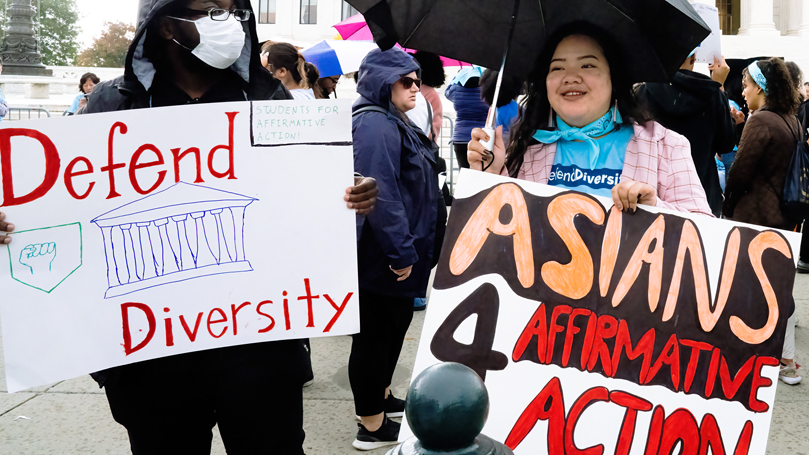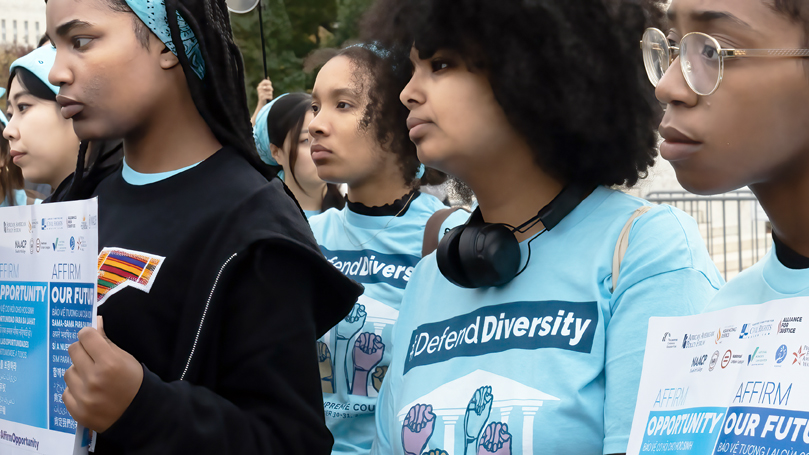
There is a multi-dimensional attack on affirmative action underway today. Affirmative action represents a group of wins by the Black, Brown, Indigenous, and worker-led civil rights movement of the 1950s and ’60s addressing the enforced denial of access for African Americans and others to voting, jobs, education, and housing. Affirmative action was a step toward addressing systemic racism, first in hiring, then in education and other areas of the economy. The ultra-right and capitalist forces are actively working to roll back all the wins from this period.
The Supreme Court is considering two cases that will gut affirmative action. The American Civil Liberties Union (ACLU) stated:
“If the court strikes down affirmative action — also known as race-conscious admissions policies — it would make it unconstitutional for universities across the country to consider a student’s race as one factor in a holistic admissions review process.”
The Supreme Court court is stacked with anti-democratic ultra-right “activist” judges due to multiple Republican presidents, most recently ex-President Donald Trump. The ultra-right judges include Clarence Thomas and Samuel Alito (both appointed by Bush), as well as Neil Gorsuch, Brett Kavanaugh, and Amy Coney Barrett (appointed by Trump).
Despite fake GOP arguments against “activist” judges, it is the ultra-right GOP-appointed judges who are overturning existing precedent to implement their “activist” agenda. These judges are also, per the NYTimes, “distinctive in a different way: [The Supreme Court] has rapidly been accumulating power at the expense of every other part of the government,” and “consolidating its power, systematically undercutting any branch of government, federal or state, that might threaten that power, while at the same time undercutting individual rights.”
The ACLU Minnesota has pointed out that in both cases in which the Supreme Court will consider the issue — Students for Fair Admissions v. President and Fellows of Harvard and Students for Fair Admissions v. University of North Carolina — the effort to undo civil rights gains is being led by Students for Fair Admissions (SFFA), an outfit led by Federalist Society fellow Edward Blum. The Supreme Court has already twice rejected Blum’s arguments, and said that universities “can consider race in admissions to promote diversity on campus and enrich students’ learning experience.” It is possible, however, that Blum will prevail this time around.
In the case of Students for Fair Admissions v. President and Fellows of Harvard, for which oral arguments were heard on October 31, 2022, Cornell Law School Legal Information Institute found:
“This case asks the Supreme Court to decide whether Grutter v. Bollinger should be overruled and whether universities should be prohibited from using race in the admission process, as well as whether Harvard violated Title VI of the Civil Rights Act by discriminating against Asian American applicants in the admission process and by rejecting workable, race-neutral alternatives. [emphasis added] Students for Fair Admissions, Inc. argues that Grutter should be overruled, that universities should not be allowed to use race as a factor in college admission, and that Harvard unlawfully discriminated against Asian American applicants. Harvard counters that Grutter should stand, that there are no workable, race-neutral alternatives, and that Harvard does not discriminate against Asian American applicants.”
In Students for Fair Admissions v. University of North Carolina, the court is asked to consider:
“Whether the Supreme Court should overrule Grutter v. Bollinger [which upheld affirmative action] and hold that institutions of higher learning cannot use race as a factor in admissions; and (2) whether a university can reject a race-neutral alternative because it would change the composition of the student body, without proving that the alternative would cause a dramatic sacrifice in academic quality or the educational benefits of overall student-body diversity.” [emphasis added]
The concept of “race neutral” alternatives is a blatant attempt to pretend that race is not a systemic and violent force in everyone’s lives in the United States, and especially in the lives of Black and Brown folks, women, and other oppressed peoples.
Affirmative action is required to weaken the impact of racist segregation on oppressed communities in the U.S. regarding access to work, education, and housing.
The initial impetus for “affirmative action” was to outlaw racist discrimination in the federal workplace. The term was first used on March 6, 1961 when President John F. Kennedy’s signed Executive Order No. 10925, which said that government contractors must “take affirmative action” to ensure fair hiring practices and on-the-job treatment regardless of “race, creed, color, or national origin.”
 Today’s U.S. Department of Labor says:
Today’s U.S. Department of Labor says:
“For federal contractors and subcontractors, affirmative action must be taken by covered employers to recruit and advance qualified minorities, women, persons with disabilities, and covered veterans. Affirmative actions include training programs, outreach efforts, and other positive steps. These procedures should be incorporated into the company’s written personnel policies. Employers with written affirmative action programs must implement them, keep them on file and update them annually.”
The democratic struggle for affirmative action is part of the struggle to acknowledge and begin to address some of the economic impact of systemic racism. Undermining affirmative action will severely impact African American access to schooling, which has implications for workplace and residential access, too.
Access to education is still a problem. One study has found that the majority of students in the U.S. are enrolled in districts that are “either more than 75% white or more than 75% nonwhite.
What is not clear on the face of the statistics is that many working-class school districts, especially majority Black and Brown districts, are underfunded due to local funding for public schools. Red lining and other systemic forces push Black and Brown people into poorer segregated neighborhoods that don’t have adequate funds for public schools available.
The attack
As the ACLU describes the cases before the Supreme Court,
“After over a hundred years of total or near total exclusion of Black students and other students of color, the University of North Carolina and Harvard began admitting larger numbers of students, including students of color, in the 1960s and ‘70s. For decades, Harvard, UNC, and other universities have had the ability to consider a student’s race along with a wide range of other factors — academic merit, athletics, extracurriculars, and others — when it comes to deciding whether to admit a student. But now, the Supreme Court could change all of this.”
The attack on affirmative action is consistent with the broad attack on full Black and Brown participation in U.S. society such as gerrymandering, limiting voting rights, and the attack on unionization. Black and Brown people are disproportionately represented in union jobs.
The Bureau of Labor Statistics reports:
“Among major race and ethnicity groups, Black workers continued to have a higher union
membership rate in 2022 (11.6 percent) than White workers (10.0 percent), Asian workers
(8.3 percent), and Hispanic workers (8.8 percent). The union membership rate declined by
0.3 percentage point for White workers, while it increased by 0.6 percentage point for
Asian workers. The union membership rates for Black workers and Hispanic workers were
little different from 2021.”
The Supreme Court attack on affirmative action is part of a general attack on democracy, including women’s health and abortion access. U.S. people are facing an attack on democracy from the Supreme Court unlike anything seen in the last sixty years, and the attack on affirmative action is a key part to that attack. Affirmative action is based on the idea that the state has a key role in addressing the social ills facing the U.S. people, including systemic racism. Affirmative action was a very important step to address systemic racism, acknowledging that systemic racism exists and requiring employers to address the lack of Black access to jobs. In education, affirmative action successfully encouraged educational institutions to include race in the consideration of applicants for enrollment.
While there is a long way to go, rolling back the acknowledgement of systemic racism, pretending to be a “race blind” or “race neutral” society and legal system, and leaving systemic racism in place will have a devastating effect on Black and other people of color, and on women.
Affirmative action is a legal recognition that systemic racism exists. While not fixing systemic racism, which requires socialism, it provides practical help for oppressed peoples to participate in the United States. False concepts like “reverse racism” and “race blindness” that animate the ultra-right are travesties of reality. These ideas are among those used by white supremacists to justify systemic racism. They claim the U.S. is a meritocracy, which is blatantly untrue at every point in a Black or Brown person’s life.
Images: Defend Diversity / Asians 4 Affirmative Action photo by Victoria Pickering (CC BY-NC-ND 2.0); Affirm opportunity, affirm our future Affirmative Action photo by Victoria Pickering (CC BY-NC-ND 2.0)


 Join Now
Join Now